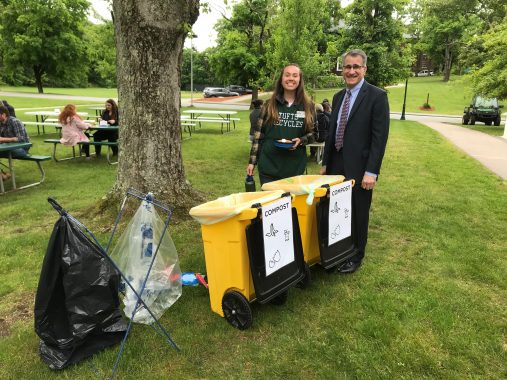History of Recycling at Tufts
 The Tufts Recycling Program is a core component of the Office of Sustainability and has grown from a student led initiative to a full time staff position and intern. Look at the timeline below to see the many strides Tufts has taken to become a more sustainable university.
The Tufts Recycling Program is a core component of the Office of Sustainability and has grown from a student led initiative to a full time staff position and intern. Look at the timeline below to see the many strides Tufts has taken to become a more sustainable university.
Program Timeline
The organization Tufts Recycles! is started by students.
Tufts starts composting yard waste with the help of students in an Environmental Economics course.
Tufts starts the Move-In Recycling program to eliminate contaminated recycling hauls during move-in and provide recycling education to new students.
Tufts starts collecting donations during student move out, originally a student effort started by Lisa Heller, founder of Dump and Run.
Tufts Dining Services begin composting food waste scraps.
The first Full-Time Recycling Coordinator is hired.
Tufts competes for the first time in Recyclemania, comes in 9th place out of 50 participating schools
Tufts starts tracking monthly recycling and waste data for a range of materials processed at Tufts.
Tufts organizes its first annual Back to School Sale to provide donations collected in the spring to students returning to campus in the fall.
Tufts ranks in 8th place in per-capita recycling rates during Recyclemania, beating Harvard and Yale Universities.
The Office of Sustainability develops and implements the Zero Waste Events programming at Tufts, composting hundreds of pounds of food waste each year at events such as Commencement, Matriculation, and Community Day.
The Tisch Library Sustainability team starts a partnership with Terracycle, primarily for protein bar and chip bag wrapper recycling, which was expanded in 2011 with an additional Eco-Reps partnership (the program was discontinued in 2020 when Terracycle canceled their brigade).
The Office of Sustainability’s Eco Reps receive a grant from the student senate to put compost bins in the residence halls.
Students in the Environmental Action class successfully campaigned to remove trays from the dining halls, saving food waste and water.
The Office of Sustainability starts an office composting program with Eco-Ambassador volunteers, including in Ballou Hall and the Gifford House.
After a push from students in the Environmental Action class, Tufts Dining switches away from plastic grocery bags and single serve bottles, instead giving out reusable water bottles.
Tufts University ranked first among NESCAC schools in recycling rates.
Tufts was honored with the silver recycling award, coming in second place to Harvard in MassRecycles’17th Annual Recycling Award Ceremony.
Freecycle rooms are installed in select dorms.
The Science and Technology Center starts recycling Styrofoam coolers from labs at the initiative of Emily Edwards from Chemical and Biological Engineering.
Tufts starts a textile recycling program with Bay State Textiles.
The Sustainability Council sets waste goals in its report.
Tufts establishes a surplus store with Personal Movers.
Tufts starts a trash buddy initiative to increase recycling rates for faculty and staff in offices through provision of small trash bins to attach to desk-side recycling bins.
Tufts starts an ink and toner recycling program with W.B. Mason.
The Office of Sustainability starts a partnership with the FIRST Resource Center to provide donations collected during student Move Out to FIRST students.
All campuses make the switch to single stream recycling.
The Office of Sustainability starts the plastic film specialty recycling program.
Labs in the Science and Technology Center starts glove recycling program with a Green Fund grant.
The reusable take-out container program is piloted in the dining halls.
The Office of Sustainability writes a comprehensive bin standard and works with Facilities to implement across all four campuses.
Tufts recycles over 500lbs of plastic film in 6 months, winning a free bench made out of recycled plastic film through the Trex recycling challenge.